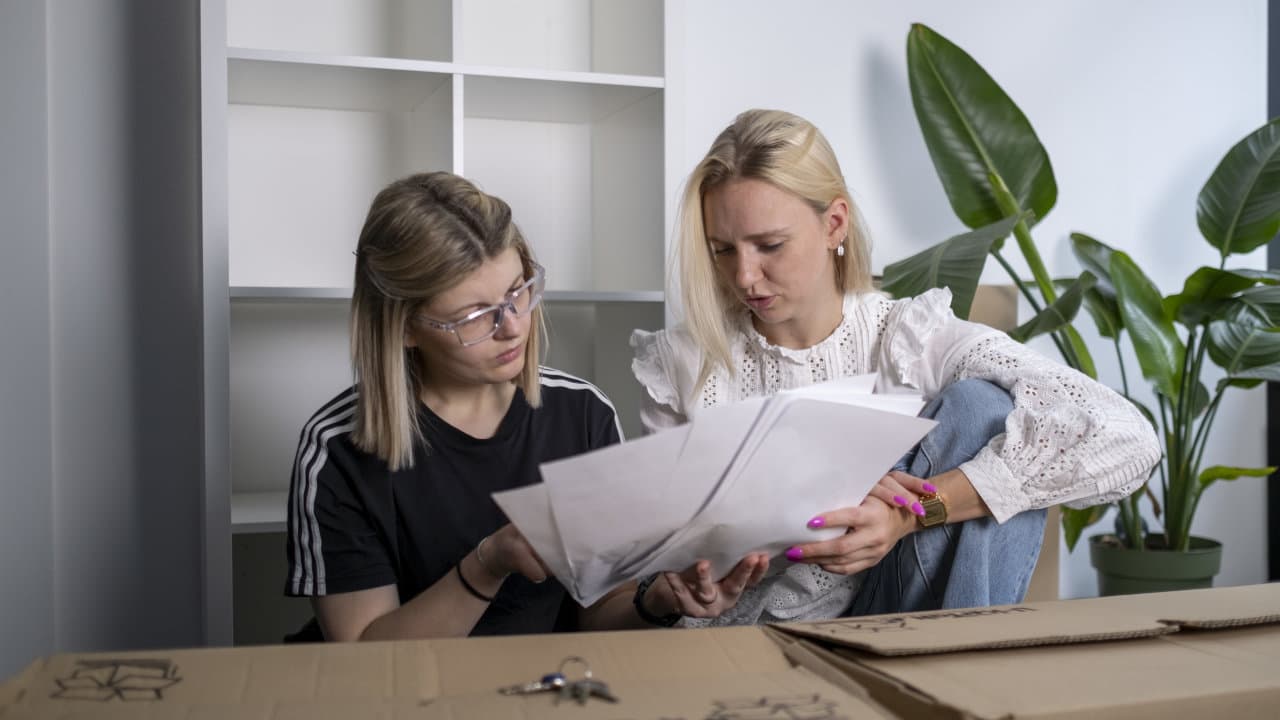Searching for a Flat
How can I find a flat in Germany?
Housing expenses have been rising sharply in Germany in recent years, and living space is becoming increasingly scarce, particularly in larger cities. The situation is better in smaller cities or rural areas, but finding an affordable flat may be a challenge even outside the large cities. The tips and information which follows will facilitate your flat-hunting, and considering them can lead to a better result.
What do I need to know?
Which documents are necessary for renting a flat?
Landlords usually require various documents from people who apply for a flat. Without these documents, in principle, you do not have any chance of finding a flat. The following documents are usually required:
- Tenant's personal information ("Mieterselbstauskunft"), including your name, your contact details (phone number and e-mail), your job title, your current address, etc. Many landlords and property management companies have their own specific personal information forms, which is usually distributed before or during the flat viewing. The applicants usually fill out the form on site and give it back to the company's agent. You can find a sample personal information form ("Mieterselbstauskunft") on www.wohnungsboerse.net.
- A copy of your Schufa credit report. You can learn more about this report in our chapter "Schufa".
- Proof(s) of income from the last three months (for employees) or your most recent tax assessment (for the self-employed). If you receive support from the Social Welfare Office or Jobcentre, you also need a copy of the respective office's confirmation that they will cover the rental costs. You can obtain this confirmation from the staff member responsible for you at the Social Welfare Office or the Job Centre.
- Proof of Rent Payment Certificate ("Mietschuldenfreiheitsbescheinigung"). On this certificate, your current landlord confirms that you have always paid your rent and there are no arrears to be paid. If you are still living in a refugee accommodation centre, the centre management or the staff responsible for you in the relevant Office can prepare you a Rent Payment Certificate.
- A copy of your passport and residence documents.
- If applicable, a copy of your WBS; i.e. a document certifying your eligibility for rent subsidised housing. You can find out more in this regard on our chapter page "WBS".
You must prepare these documents both in print in a folder and as a PDF file to be sent by e-mail. Some landlords expect the documents to be handed directly during the flat viewing - others may ask you to submit your papers by e-mail. In the latter case, send the necessary documents to the specified address as quickly as possible, as landlords usually prefer to pick the first tenant who meets the requirements.
Tip: You can increase your chances by adding a cover letter to your application- in this letter you can briefly introduce yourself and your family, explain your life situation in Germany and describe your plans for the future (e.g. you will soon start vocational training or a university degree). If you do not speak German well enough yet, it is advisable to give the contact details of a German-speaking friend for further pre-contractual communication. Many landlords are concerned that they may not be able to communicate with their non-German tenants in case of a problem; that is why a German-speaking friend or acquaintance can be quite helpful.
Where should I search for a flat?
Some newspapers and magazines still publish housing ads, but internet ads exceed them in number by far, so the best place to start your search is online.
On housing websites, you can specify the rent range, location and other features of the flat you are searching for and then go through the details of your search result one by one. Many websites also offer you the opportunity to set up an alarm, by which the website would automatically send you a message anytime an apartment matching your search terms is added to their database. On websites like eBay Kleinanzeigen, Immobilienscout24 and Immonet, you can find numerous ads and search for what suits your needs.
On WG-gesucht you can not only search for suitable rooms in shared flats, you can also find offers for temporary apartments, for example. You can find more information on the topic of “Temporary living” on our “Types of housing” page.
Online ads often include images of the place and all necessary information, including rent, utility costs, the date you can move in, and the preferred channels of communication with the landlord. In principle, the landlords expect the applicants to send them a message via the housing website or an email.
If you ask for an appointment to see the flat in the message, it is also worth writing a few sentences about yourself. Particularly in large cities, landlords usually rent their apartments to interested parties swiftly and the advertisement quickly disappears.
Another tip is to enquire at housing cooperatives (Wohnungsbaugenossenschaften or WBG). Building or housing cooperatives, as they are often called, aim to provide their members with affordable housing. In order to get an apartment through a cooperative, you must become a member. As a member, you are also a co-owner of the cooperative. Housing cooperatives do not generate profits, but invest the money in financing, maintaining and managing the living space. When you become a member, you pay cooperative shares, which can amount to several hundred to thousands of euros - depending on the size of the apartment. It's similar to a deposit for landlords. When you move out, you usually leave the cooperative and get the money back. You pay a comparatively low rent for the apartment. As demand for cooperative apartments is high, you may initially be placed on a waiting list. To find housing cooperatives in your city, search the Internet for your city + “Wohnungsbaugenossenschaft”, “Wohnungsgenossenschaft”, “Baugenossenschaft”, ‘Bauverein’ or “Wohnungsverein”.
Who can help me with the flat hunting?
In some cities, there are organisations which provide help for individuals who are searching for a flat. Counselling centres for Adult Migrants as well as the Youth Migration Service in your area can give you the addresses of meeting places and clubs nearby. Friends and acquaintances can be of great help - ask them if they can help you in your search. They may know someone who is renting a flat or looking for a new tenant who can substitute for them. The more people know about your search, the higher your chances of ending up with a nice flat.
You can also hire a broker to find you a flat, but make sure you choose a reliable one. You must only pay a broker if you have successfully signed a contract for the flat he has found. A broker usually charges you the equal amount of two rents plus the VAT (“Mehrwertsteuer”) for their service.
How can I protect myself against scams and fictitious apartment ads?
As the number of people in looking for flats is constantly on the rise, many are in urgent need of a flat- and this is a situation the fraudsters misuse to benefit. That is why you should be cautious during your search, mainly when an opportunity seems “too good to be true”, in particular, when a flat is too cheap or in cases where the other party demands you to transfer the money beforehand and promises to send you the keys later. The same is the case when you are asked to pay the deposit in cash on the flat viewing day. Important: Remember, you should never pay before signing an actual rental contract and receiving the keys to the flat.
If you have decided to hire a property management agents to find you a flat, make sure you never pay unless the amount of your payment and its purpose is explicitly clarified in a written agreement. The payment should take place when they have successfully found you a flat. Make sure the property management agent you have found is legitimate - some fraudsters would introduce themselves as a property management agent, take your money but cut contact afterwards.
Where can I get support for my monthly rent when I do not have any income?
If you receive financial support from the Social Welfare Office or Job Centre, you have to notify them before you start looking for a flat. The Social Welfare Office and Job Centre cover the rental costs up to a certain amount and only if certain conditions are met. So in the first step, you must ask your administrative assistant to endorse your flat-hunting by a written confirmation. You can find more detailed information on our topic page “Renting an apartment”.
What is “Wohngeld”? Can I apply for it?
“Wohngeld” is a subsidy towards your rent. The money usually goes to people who cannot cover their rent fully with their own income. Therefore, if your entire rent is being paid by the state, you are not entitled to “Wohngeld”. This applies, for example, to people who receive benefits from the job center or social welfare office or receive BAföG.
You can find out more about this topic on our topic page “Housing benefit”.
What is social housing?
If you earn little or no money, you are entitled to social housing. Social housing refers to flats which are cheaper than others because the state subsidises them. You can find more detailed information our our topic page “Types of housing”.
I want to live in a WG (“Wohngemeinschaft”)
In a "Wohngemeinschaft" or WG, several persons share a flat. In most WGs everyone has their own room, but the bathroom and kitchen are shared. Finding a room in a shared flat usually is somewhat easier than finding your own flat, because you do not have to convince a landlord, but only the member(s) of the flat share. Furthermore, a room is cheaper than a whole flat.
If you receive financial support from the Job Centre or Social Welfare Office, you will need to submit to the Office both your sublease agreement and the primary tenant's rental contract. Many administrative assistants also want to see a confirmation from the landlord which proves the primary tenant is allowed to sublet the room.
How can I increase my chances of success during the flat viewing session?
- Arriving on time for the viewing appointment increases your chances. You can be one of the first to speak to the landlord and show interest in the apartment, especially during group viewings.
- If there is a large group of applicants, try to directly talk to the landlord and make a good impression. If you ask relevant questions about the apartment and also say something about yourself, the landlord may remember you.
- Prepare your folder with all the necessary documents beforehand.
- A cover letter to the landlord can enhance the application portfolio. Share something about yourself that is not obvious from the documents - it may help you to be shortlisted.
You can learn more in our chapter “Rental Contract”.
What should I consider when signing the rental contract?
You can learn all about this in our chapter “Rental Contract”.
What should I do after signing the contract?
You can find all the information you need on our “ Rental contract” topic page.
Discrimination when looking for housing in Germany: challenges and support available
Discrimination when looking for accommodation is, unfortunately, still a reality in Germany, despite legal regulations and efforts to achieve equal rights.
People with an international background and BIPoC, people with disabilities or LGBTQIA+ people are often confronted with discrimination and prejudice in the housing market.
One of the most common forms of discrimination is racism. Flat seekers with names and appearances that are not read as white-German are often discriminated against. Landlords or estate agents may have prejudices based on stereotypes or assumptions and thus discriminate against potential tenants based on their origin or appearance.
People with disabilities also encounter difficulties when looking for accommodation. Accessible housing is often only available to a limited extent and landlords are reluctant to make the necessary adaptations. This leads to limited choices and makes it difficult for people with disabilities to access appropriate housing.
The LGBTQIA+ community also experiences discrimination in the housing market. Some landlords may be prejudiced against homosexual, bisexual or transgender and non-binary people and reject them because of their sexual identity or gender identity.
In order to combat these forms of discrimination, both legal measures and measures to raise public awareness are necessary. Landlords and real estate agents need to be made aware of the need to overcome prejudice, and it is important that compliance with anti-discrimination laws is effectively monitored. An open and inclusive housing policy is crucial to ensure that all people, regardless of their origin, ethnicity, disability or sexual identity and gender identity, have equal opportunities to adequate housing.
If you are having difficulties finding accommodation due to discrimination, there are various ways to get support. Advice centres, organisations and legal advisors can advise you, give you information about your rights and support you in taking legal action. Housing offices, authorities, self-help groups and sharing your experiences can also help you to take action against discrimination and fight for equal rights when looking for accommodation.
Find out more about forms of discrimination and support options on our topic page “Discrimination”.
I live in shared accommodation for refugees. Can I move into a flat?
Not all people who are still living in shared accommodation for refugees are allowed to move into a flat. If you have been recognised and have a residence permit as a “person entitled to asylum”, "refugee" or “person entitled to subsidiary protection”, you may move into a flat. You can find out more about this and whether you are allowed to move to another district on our topic page “Shared accommodation for Refugees”.
I am homeless/ on the verge of becoming homeless. Where can I find support?
Difficulties and uncertainties with housing can be very stressful for those affected. The “Wohnungsnotfallhilfe” supports people in difficult housing situations who are currently homeless or at risk of becoming homeless. A counsellor can support you in overcoming the emergency and finding solutions together.
Depending on the advice centre, you will receive various offers of help such as support in finding accommodation, advice on rent debts and impending loss of accommodation, as well as information on emergency accommodation. You can find general information on emergency housing assistance on the “social platform”. Advice is free of charge and can be provided anonymously if desired.
You can use the advice centre finder on the social platform to find a suitable advice centre near you. To do this, select the option “Wohnungsnotfallhilfe” in the filter and enter your zip code or place of residence. Some advice centres also offer advice in languages other than German.
Important
Never pay before signing a contract. If you do not fully understand the contract in German, ask a friend to explain it to you. Make sure that you agree to all terms and conditions specified before putting your signature under any document.
Similar topics
Additional links
EU Equality Office
The EU Equality Office provides useful information about the housing market and rental contracts in Germany.
Refugees Welcome
On this website, you can apply for a room in shared flats all over Germany.
Our community in the forum
Quickly find answers to any question. Benefit from the experience of your community and exchange ideas.
Support on site
Are you looking for counseling centers, meeting points, and other services? Use our search engine.










